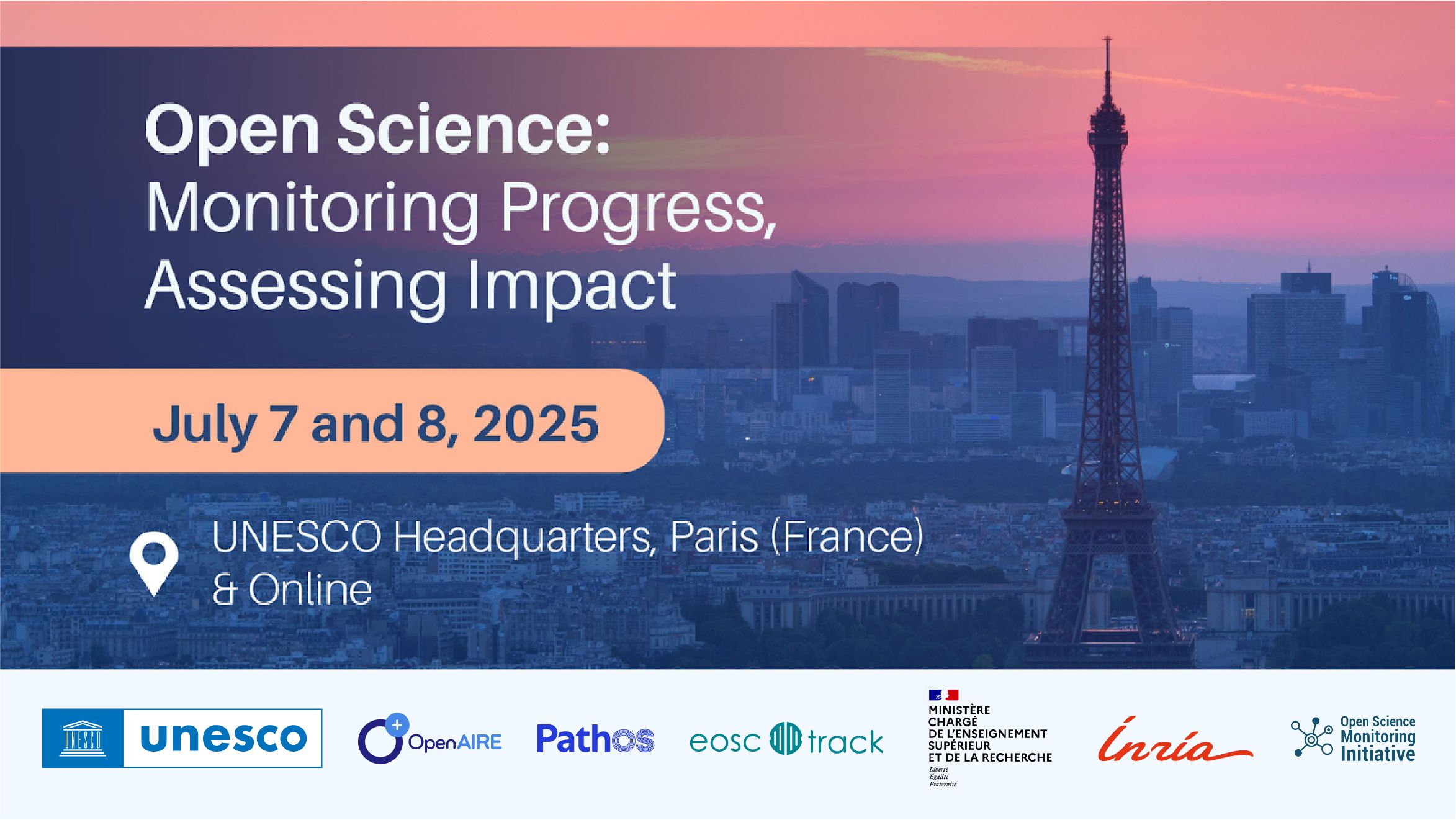
About Open Science: Monitoring Progress, Assessing Impact Conference
UNESCO, OpenAIRE, PathOS, EOSC Track, the French Ministry of Higher Education, Research and Innovation, the National Institute for Research in Digital Science and Technology and OSMI, are pleased to announce the international conference “Open Science: Monitoring Progress, Assessing Impact,” to be held 7–8 July 2025 at UNESCO Headquarters in Paris and online.
The event will also mark the culmination of the PathOS project, highlighting its key results and offering actionable insights into the impact of open science practices.
This two-day conference will bring together global experts, policymakers, and open science practitioners to explore the state of the art in monitoring and assessing the impact of open science.
A Platform for Knowledge, Practice, and Policy
The conference will present key findings from PathOS's three-year journey to identify and analyse how Open Science practices impact academia, society, and innovation. These findings—drawn from in-depth case studies, a scoping reviews, and methodological frameworks—will help build a stronger evidence and tool base to support decision-making and policy development. The conference will also feature the Principles of Open Science Monitoring developed by OSMI, insights from the EOSC Open Science Observatory and the EOSC Track project, as well as global insights and vision from UNESCO.
Key themes include:
- Evidence & Tools for Measuring Impact: Explore how PathOS findings, support evidence-based decision-making and help assess the contributions of open science to research progress, innovation and societal benefits, while identifying gaps and challenges in the state-of-the-art.
- Principles of Open Science Monitoring: Reflect on OSMI’s globally consulted monitoring principles and discuss their operationalization across diverse stakeholders, including the role of open science infrastructures, to enable scalable and adaptable approaches to tracking progress.
- Scaling Up Monitoring Efforts: Discuss frameworks and best practices for enhancing open science monitoring at various levels.A highlight of this session will be the official launch of the second phase of the EOSC Open Science Observatory—a next-generation policy intelligence tool designed to visualize national contributions to EOSC and Open Science. Built on insights from the Monitoring Framework for National Contributions to EOSC and Open Science.
- Global Vision & UNESCO Recommendation: Explore how diverse regional and national monitoring efforts align with UNESCO’s Recommendation on Open Science, fostering dialogue on inclusivity, equity, and sustainability in the global research ecosystem.
- Hands-On Workshops: Practical sessions will focus on evidence-based approaches to open science monitoring and evaluation. Participants will engage with key PathOS outputs, including the Open Science Indicator Handbook, the Cost-Benefit Analysis framework for open science practices, and the overall findings and conclusions from the project, contributing feedback to refine and strengthen the final results.
- Cross-Initiative Synergy: A special joint session with the OPUS project will examine alignment between Open Science policies and monitoring at institutional, national, and global levels.
Bringing It All Together
This conference provides a unique platform for global experts, policymakers, and practitioners to share knowledge, refine tools, and shape the future of open science monitoring. Through presentations, panel discussions, hands-on workshops, and open dialogue, participants will explore innovative approaches, address implementation challenges, and collaborate on practical solutions.
By integrating evidence-based methodologies, guiding principles, and targeted training, the event aims to catalyse new partnerships, empower stakeholders, and advance a shared vision of inclusive, high-impact research practices worldwide.
Contact:
Tereza Szybisty,